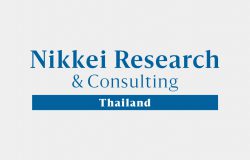What do employees think about when they hear the term “corporate compliance”? For some, it is a normal part of doing business – the way of work that all companies must follow in order to maintain systems and standards. For others, it is a burden – troublesome hassles that make doing work boring, restricting, and difficult. And finally for some, it is a question mark – something they’ve heard about and know that they should do, but not sure how or why. Regardless of the different opinions, employees and employers both agree that corporate compliance is a necessary function for managing business.
Earlier this year, Nikkei Research & Consulting (Thailand) conducted an online survey* to study corporate compliance practices of companies in Japan and Thailand. This was in anticipation and preparation for the upcoming Personal Data Protection Act (PDPA) and how it would impact companies’ compliance practices. Furthermore, the impact of COVID-19 has forced many companies to rethink their security and risk management systems beyond just the traditional office space. As the way companies conduct work may be dramatically changed, awareness, perceptions, and understanding of corporate compliance will become more important than ever.

Awareness & Perceptions
When seeing a translation of the term Corporate Compliance, many different “standard” definitions currently seem to exist in Thai, such as Supervision (การกำกับดูแล), Regulatory Compliance (การกำกับการปฏิบัติตามกฎเกณฑ์), Operational Oversight (การกำกับการปฏิบัติงาน), Compliance (การปฏิบัติตาม), Surrender (การจำนน), Compliance with Regulations (การปฏิบัติตามกฎระเบียบข้อบังคับ), and Laws (กฎหมาย). In some cases, the actual term compliance is used as the English word, in organizations that have roles dedicated to this function. This shows that currently there is a potentially a wide range of different perceptions and understandings about corporate compliance.
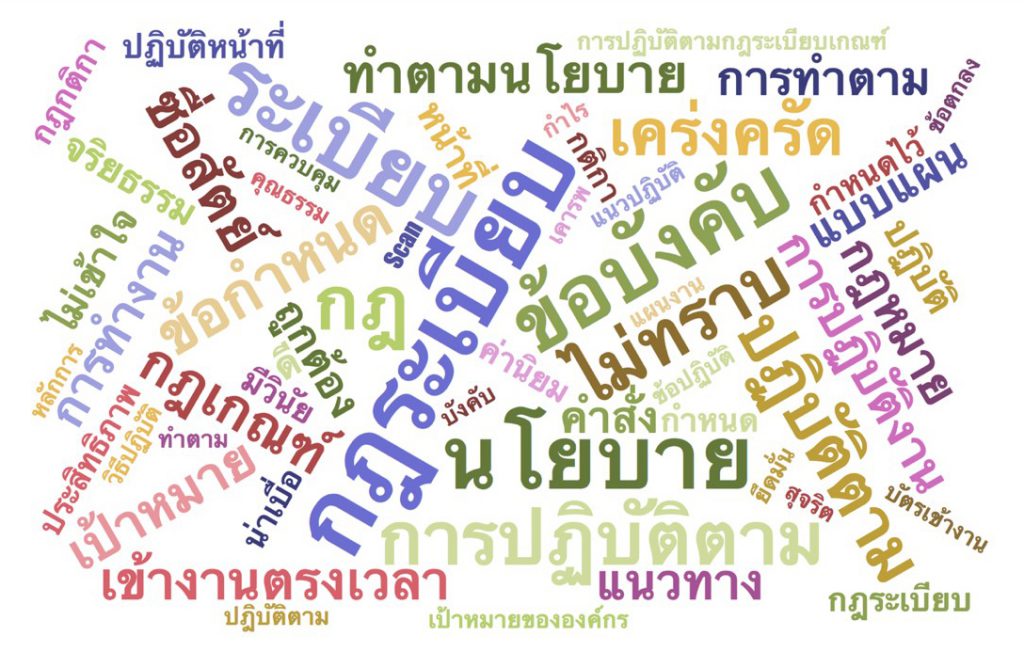
The word cloud above is a summary from our survey question: What do you associate with when hearing of the term corporate compliance. This word cloud was created after coding each answer. The size of each word or phrase in the word cloud represents the frequency that it was mentioned. The top ten terms based on frequency of mentions were as follows:
- Regulations (กฎระเบียบ)
- Orderly (ระเบียบ)
- Policies (นโยบาย)
- Restrictions (ข้อบังคับ)
- Rules (กฎ)
- Corporate culture (วัฒนธรรมองค์กร)
- Don’t know (ไม่ทราบ)
- Follow/Comply (การปฏิบัติตาม)
- Strict (เคร่งครัด)
- Honest (ซื่อสัตย์)
Based on these employee comments, here are some observations that we would like to highlight:
- The most common perception employees associate with when thinking about corporate compliance is related to how work is expected to be conducted – based on regulations, in an orderly fashion, governed by company policies, restrictions, and rules.
- Many believe that corporate compliance refers to the company’s business philosophy, as seen by mentions such as corporate culture (วัฒนธรรมองค์กร), values (ค่านิยม), goal (เป้าหมาย), and direction (แนวทาง).
- Some employees also willingly admit that they don’t know what corporate compliance refers to. This does not include those who said that they do not understand (ไม่เข้าใจ).
- Employees also cited specific examples of corporate compliance such as arriving on-time for work, scanning employee card when coming to work, wearing uniforms or same colored shirts on assigned days, and obeying instructions from bosses.
- A number of employees also stated that corporate compliance means knowing your role, your responsibilities, and performing your duties to the fullest capability.
We can conclude that the majority of employees in Thailand are aware of and give importance to corporate compliance. However, are these perceptions of corporate compliance understood correctly?
Understanding
According to the recent global discussion, corporate compliance can be defined as adhering to legal rules, adhering to corporate rules, adhering to corporate ethics, and/or adhering to general social ethics. Thus in our survey, the higher the percentage of employees who agree that all four categories are included in the definition of corporate compliance, the more important it is perceived to be in their organizations.
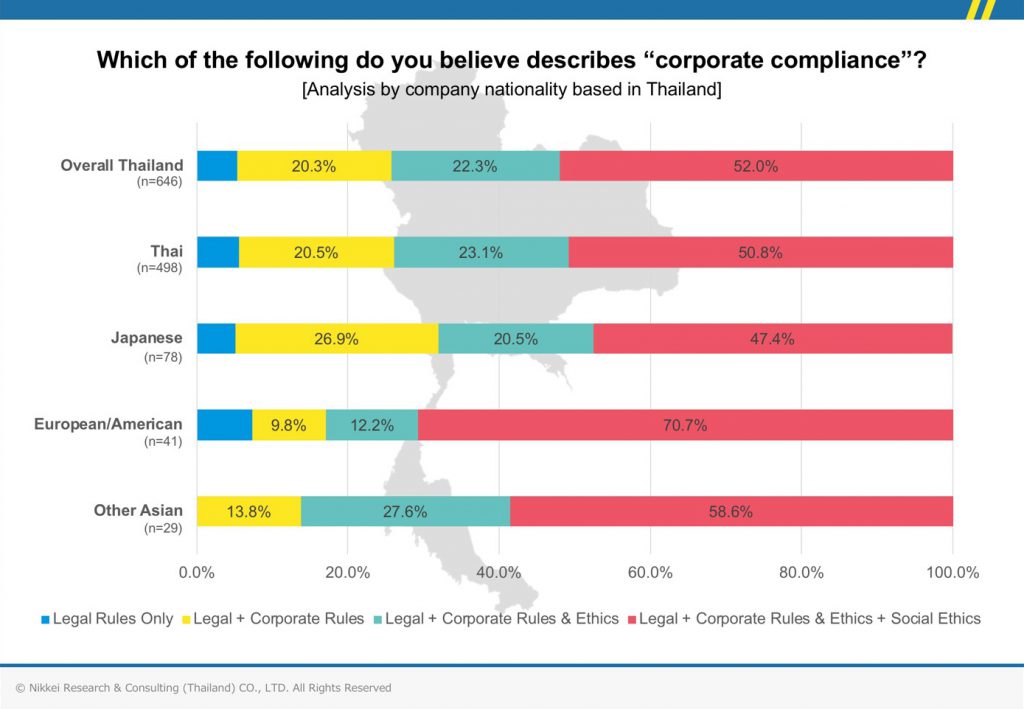
On average, 52% of employees in Thailand believe that corporate compliance includes all four of these categories, with employees of European/American companies agreeing the most (71%). When analyzing the data of Thailand by company size, the percentage gradually increases in relation to headcount, with the highest the percentage displayed in those with over 5000 employees (56%).
From these results, it appears that European/American companies seem to put more efforts in emphasizing compliance. Also, larger organizations seem to dedicate more resources into educating their higher number of employees. The challenge that all companies similarly face, however, is not just to educate employees to have a broad perception of what compliance is, but to ensure the same level of awareness and understanding amongst all employees. Most importantly, companies need to inspire a high level of commitment to follow through on these expectations as well.
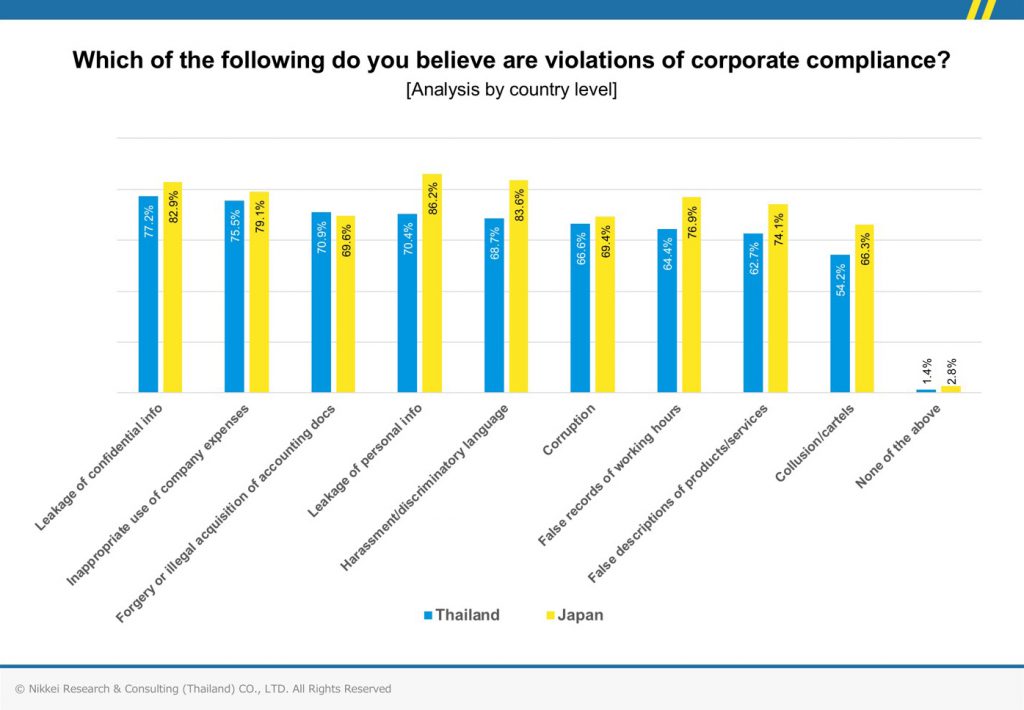
There are many examples of potential compliance violations, some easily understood while some may seem less certain. At the country level, Thailand scored lower than Japan on all items except for one. The top three issues employees in Thailand clearly viewed as compliance violations were leakage of confidential information (77.2%); inappropriate use/misappropriation of company expenses (75.5%); and forgery or illegal acquisition of accounting documents (70.9%). These results illustrate which items seem to be more clearly and commonly understood compared to others. The bottom three issues that were less clearly viewed as compliance violations were collusion/cartels (54.2%); false descriptions of products/services (62.7%); and false records of working hours (64.4%). This may be because employees feel those issues may not happen easily even though they understand them as problems.
The priority for organizations, however, is not to try to quiz employees in order to evaluate how many issues they can correctly identify as violations. Instead, companies should find ways to collect this kind of feedback from their employees to measure the current levels on issues that the company has defined as violations in order to take further actions to increase the level of understanding.
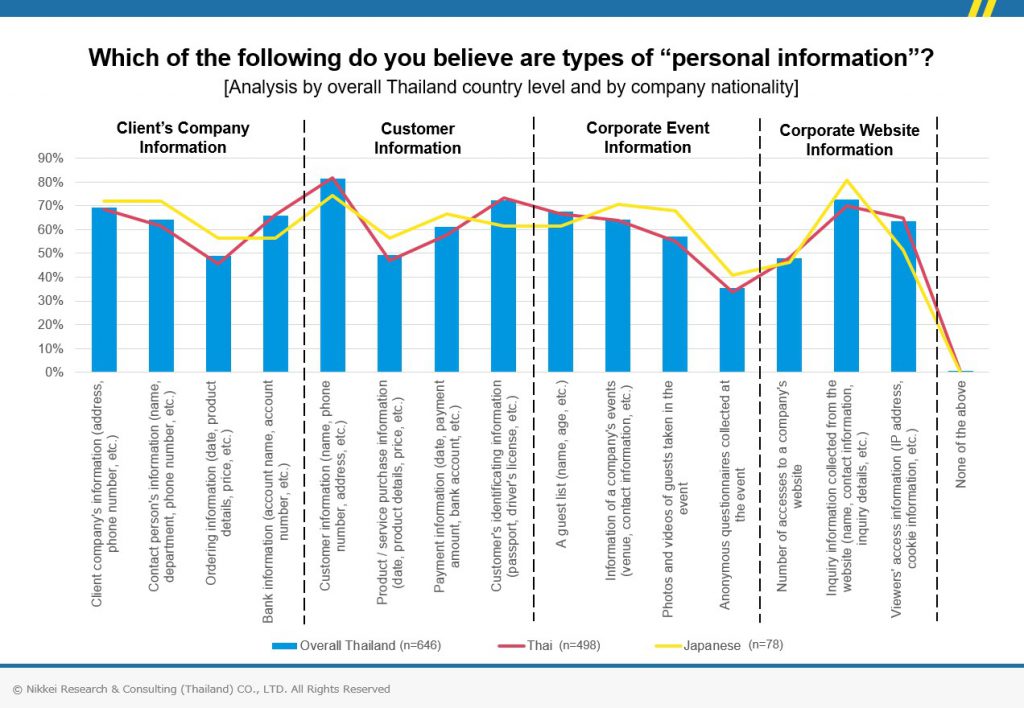
As mentioned regarding the upcoming PDPA in Thailand , another key issue that is to properly understand the definition of personal information. According to the General Data Protection Regulation (GDPR) , ‘personal data’ means any information relating to an identified or identifiable natural person (‘data subject’); an identifiable natural person is one who can be identified, directly or indirectly, in particular by reference to an identifier such as a name, an identification number, location data, an online identifier or to one or more factors specific to the physical, physiological, genetic, mental, economic, cultural or social identity of that natural person. As the toughest privacy and security law in the world, companies can use this as the highest standard for employee understanding. Companies need to have access to information that shows the current level of understanding employees have about what does or does not constitute as personal information, as well as to properly train employees as necessary.
Looking Ahead
Based on these results, we can observe some interesting patterns about the current awareness, perceptions, and understanding about corporate compliance. One effective way to increase the efficiency and effectiveness of these practices is to provide sufficient channels to collect feedback and for employees to raise any concerns. In the upcoming articles, we will dive deeper into specific compliance issues that seem to be occur commonly, and ways that companies can take action in order to avoid and prevent such risks.
* Nikkei Research & Consulting (Thailand) conducted an online research survey during January 2020 with full-time employees of companies in Japan (n=579 nationwide) and Thailand (n=646 Bangkok metropolitan area).

